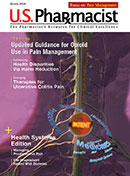Completion of the two-dose series of the recombinant zoster vaccine (RZV) was suboptimal in the early stages of implementation, according to a new study.
The report in the journal Vaccine found that increased completion was associated with greater outpatient and decreased inpatient utilization. Kaiser Permanente Southern California–led researchers recommend that education, reminders, and taking better advantage of opportunities to vaccinate could remedy the problem.
Background information in the article points out that in 2017, RZV was recommended for adults aged 50 years and older as a two-dose series 2 to 6 months apart. The authors evaluated two-dose RZV completion and factors associated with completion.
Included in the study were Kaiser Permanente Southern California members aged 50 years and older who received an RZV dose from April to November 2018 and had continuous membership 12 months before to 9 months after the first RZV dose. For purposes of the study, completion was defined as receipt of the second dose 4 weeks or more to 9 months after the first dose, which allowed a 3-month grace period.
Researchers compared characteristics—including age, sex, race/ethnicity, Medicaid status, neighborhood level income and education, comorbidities, history of zoster, healthcare utilization before and after the first dose, receipt of influenza vaccine, vaccination month (supply shortage proxy), concomitant vaccine, medical center, and medically attended reaction, pain, or gout after the first dose—between completers and noncompleters.
Results indicate that among 31,120 first-dose recipients, 67.2% completed the series within 9 months. The authors reported that, in adjusted analyses, higher completion was associated with:
• White compared with Black or Hispanic race/ethnicity
• Higher neighborhood income and education
• No chronic pulmonary disease, diabetes, or dementia
• More outpatient visits and fewer emergency department visits before or after the first dose
• No hospitalizations after the first dose
• Receipt of influenza vaccine
• Receipt of the first dose from June to November rather than from April to May 2018
• No concomitant vaccine with the first dose.
Interestingly, systemic reactions or pain after the first dose was not associated with completion. “Completion of RZV series appears suboptimal in the early phase of implementation,” the authors concluded. “Despite similar accessibility in a health care system, completion varied by race/ethnicity, socioeconomic status, health status, and care seeking behavior, suggesting areas to target for improvement.”
The content contained in this article is for informational purposes only. The content is not intended to be a substitute for professional advice. Reliance on any information provided in this article is solely at your own risk.
« Click here to return to Vaccine Update.
Published February 17, 2021






